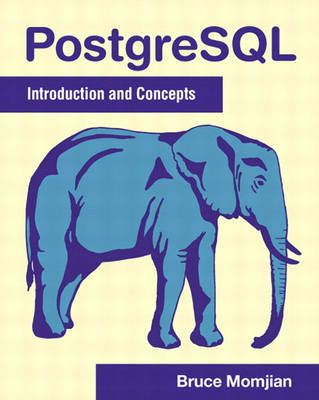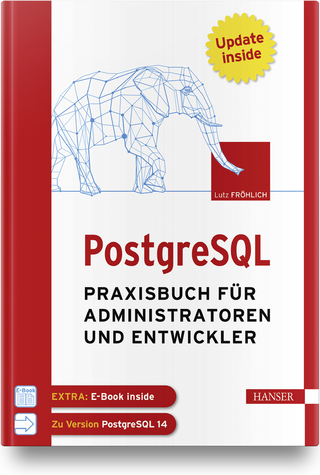
PostgreSQL
Addison Wesley (Verlag)
978-0-201-70331-3 (ISBN)
- Titel ist leider vergriffen;
keine Neuauflage - Artikel merken
The open source PostgreSQL database is soaring in popularity, as thousands of database and web professionals discover its powerful features, transaction support, performance, and industrial-strength scalability. In this book, a founding member of the PostgreSQL development team introduces everything you need to know to succeed with PostgreSQL, from basic SQL commands through database administration and optimization. PostgreSQL assumes no previous database expertise: it establishes a firm foundation of basic concepts and commands before turning to PostgreSQL's advanced, innovative capabilities. Bruce Momjian walks readers step-by-step from their first database queries through the complex queries needed to solve real-world problems. He presents proper query syntax, then explores the value and use of each key SQL commands in working applications. Learn to manipulate and update databases, customize queries, work with SQL aggregates, use joins, combine SELECTs with subqueries, work with triggers and transactions, import and export data, use PostgreSQL query tools, and more.
Discover PostgreSQL techniques for server-side programming and multi-user control, and master PostgreSQL's interfaces to C, C++, ODBC, JDBC, Perl, and Tcl/TK. You'll also find detailed coverage of PostgreSQL administration, including backups, troubleshooting, and access configuration.
Bruce Momjian is a founding member of the PostgreSQL Global Development Team. He is currently a senior consultant with Wilson Technology Associates in Newtown Square, Pennsylvania, designing and developing relational database applications for some of the largest law firms nationwide. 0201703319AB04062001
List of Figures.
List of Tables.
Foreword.
Preface.
Acknowledgments.
Steering.
Major Developers.
Non-code Contributors.
History of POSTGRESQL.
Introduction.
University of California at Berkeley.
Development Leaves Berkeley.
POSTGRESQL Global Development Team.
Open Source Software.
Summary.
Issuing Database Commands.
Starting a Database Session.
Choosing an Interface.
Choosing a Database.
Starting a Session.
Controlling a Session.
Typing in the Query Buffer.
Displaying the Query Buffer.
Erasing the Query Buffer.
Getting Help.
Exiting a Session.
Summary.
Basic SQL Commands.
Relational Databases.
Creating Tables.
Adding Data with INSERT.
Viewing Data with SELECT.
Selecting Specific Rows with WHERE.
Removing Data with DELETE.
Modifying Data with UPDATE.
Sorting Data with ORDER BY.
Destroying Tables.
Summary.
Customizing Queries.
Data Types.
Quotes Inside Text.
Using NULL Values.
Controlling DEFAULT Values.
Column Labels.
Comments.
AND/OR Usage.
Range of Values.
LIKE Comparison.
Regular Expressions.
CASE Clause.
Distinct Rows.
Functions and Operators.
SET, SHOW, and RESET.
Summary.
SQL Aggregates.
Aggregates.
Using GROUP BY.
Using HAVING.
Query Tips.
Summary.
Joining Tables.
Table and Column References.
Joined Tables.
Creating Joined Tables.
Performing Joins.
Three- and Four-Table Joins.
Additional Join Possibilities.
Choosing a Join Key.
One-to-Many Joins.
Unjoined Tables.
Table Aliases and Self-joins.
Non-equijoins.
Ordering Multiple Parts.
Primary and Foreign Keys.
Summary.
Numbering Rows.
Object Identification Numbers (OIDs).
Object Identification Number Limitations.
Nonsequential Numbering.
Nonmodifiable.
Not Backed Up by Default.
Sequences.
Creating Sequences.
Using Sequences to Number Rows.
Serial Column Type.
Manually Numbering Rows.
Summary.
Combining SELECTs.
UNION, EXCEPT, and INTERSECT Clauses.
Subqueries.
Subqueries as Constants.
Subqueries as Correlated Values.
Subqueries as Lists of Values.
NOT IN and Subqueries with NULL Values.
Subqueries Returning Multiple Columns.
ANY, ALL, and EXISTS Clauses.
Summary.
Outer Joins.
Subqueries in Non-SELECT Queries.
UPDATE with FROM.
Inserting Data Using SELECT.
Creating Tables Using SELECT.
Summary.
Data Types.
Purpose of Data Types.
Installed Types.
Character String.
Number.
Temporal.
Logical.
Geometric.
Network.
Internal.
Type Conversion Using CAST.
Support Functions.
Support Operators.
Support Variables.
Arrays.
Large Objects (BLOBs).
Summary.
Transactions and Locks.
Transactions.
Multistatement Transactions.
Visibility of Committed Transactions.
Read Committed and Serializable Isolation Levels.
Locking.
Deadlocks.
Summary.
Performance.
Indexes.
Unique Indexes.
CLUSTER.
VACUUM.
VACUUM ANALYZE.
EXPLAIN.
Summary.
Controlling Results.
LIMIT.
Cursors.
Summary.
Table Management.
Temporary Tables.
ALTER TABLE.
GRANT and REVOKE.
Inheritance.
Views.
Rules.
LISTEN and NOTIFY.
Summary.
Constraints.
NOT NULL.
UNIQUE.
PRIMARY KEY.
Foreign Key/REFERENCES.
Modification of Primary Key Row.
Multicolumn Primary Keys.
Handling NULL Values in the Foreign Key.
Frequency of Foreign Key Checking.
CHECK.
Summary.
Importing and Exporting Data.
Using COPY.
COPY File Format.
DELIMITERS.
COPY Without Files.
Backslashes and NULL Values.
COPY Tips.
Summary.
Database Query Tools.
Psql.
Query Buffer Commands.
General Commands.
Output Format Options.
Output Format Shortcuts.
Variables.
Listing Commands.
Large Object Commands.
Psql Command-line Arguments and Start-up File.
Pgaccess.
Summary.
Programming Interfaces.
C Language Interface (LIBPQ).
Pgeasy (LIBPGEASY).
Embedded C (ECPG).
C++ (LIBPQ++).
Compiling Programs.
Assignment to Program Variables.
ODBC.
Java (JDBC).
Scripting Languages.
Perl.
TCL/TK (PGTCLSH/PGTKSH).
Python.
PHP.
Installing Scripting Languages.
Summary.
Functions and Triggers.
Functions.
SQL Functions.
PL/PGSQL Functions.
Triggers.
Summary.
Extending POSTGRESQL Using C.
Write the C Code.
Compile the C Code.
Register the New Functions.
Create Operators, Types, and Aggregates.
Summary.
Administration.
Files.
Creating Users.
Creating Databases.
Access Configuration.
Local.
Host and Hostssl.
User Mappings.
Examples.
Backup and Restore.
Server Start-up and Shutdown.
Monitoring.
Performance.
System Tables.
Internationalization.
Upgrading.
Summary.
Additional Resources.
Mailing List Support.
Supplied Documentation.
Commercial Support.
Modifying the Source Code.
Frequently Asked Questions (FAQs).
Installation.
Getting POSTGRESQL.
Creating the POSTGRESQL User.
Configuration.
Compilation.
Installation.
Initialization.
Starting the Server.
Creating a Database.
PostgreSQL Nonstandard Features by Chapter.
Reference Manual.
ABORT.
ALTER GROUP.
ALTER TABLE.
ALTER USER.
BEGIN.
CLOSE.
CLUSTER.
COMMENT.
COMMIT.
COPY.
CREATE AGGREGATE.
CREATE CONSTRAINT TRIGGER.
CREATE DATABASE.
CREATE FUNCTION.
CREATE GROUP.
CREATE INDEX.
CREATE LANGUAGE.
CREATE OPERATOR.
CREATE RULE.
CREATE SEQUENCE.
CREATE TABLE.
CREATE TABLE AS.
CREATE TRIGGER.
CREATE TYPE.
CREATE USER.
CREATE VIEW.
createdb.
createlang.
createuser.
DECLARE.
DELETE.
DROP AGGREGATE.
DROP DATABASE.
DROP FUNCTION.
DROP GROUP.
DROP INDEX.
DROP LANGUAGE.
DROP OPERATOR.
DROP RULE.
DROP SEQUENCE.
DROP TABLE.
DROP TRIGGER.
DROP TYPE.
DROP USER.
DROP VIEW.
dropdb.
droplang.
dropuser.
ecpg.
END.
EXPLAIN.
FETCH.
GRANT.
initdb.
initlocation.
INSERT.
ipcclean.
LISTEN.
LOAD.
LOCK.
MOVE.
NOTIFY.
pg_ctl.
pg_dump.
pg_dumpall.
pg_passwd.
pg_upgrade.
pgaccess.
pgtclsh.
pgtksh.
postgres.
postmaster.
psql.
REINDEX.
RESET.
REVOKE.
ROLLBACK.
SELECT.
SELECT INTO.
SET.
SHOW.
TRUNCATE.
UNLISTEN.
UPDATE.
VACUUM.
vacuumdb.
Bibliography.
Index. 0201703319T04062001
| Erscheint lt. Verlag | 13.12.2000 |
|---|---|
| Verlagsort | Boston |
| Sprache | englisch |
| Maße | 187 x 234 mm |
| Gewicht | 739 g |
| Themenwelt | Informatik ► Datenbanken ► PostgreSQL |
| Mathematik / Informatik ► Informatik ► Software Entwicklung | |
| ISBN-10 | 0-201-70331-9 / 0201703319 |
| ISBN-13 | 978-0-201-70331-3 / 9780201703313 |
| Zustand | Neuware |
| Informationen gemäß Produktsicherheitsverordnung (GPSR) | |
| Haben Sie eine Frage zum Produkt? |
aus dem Bereich

